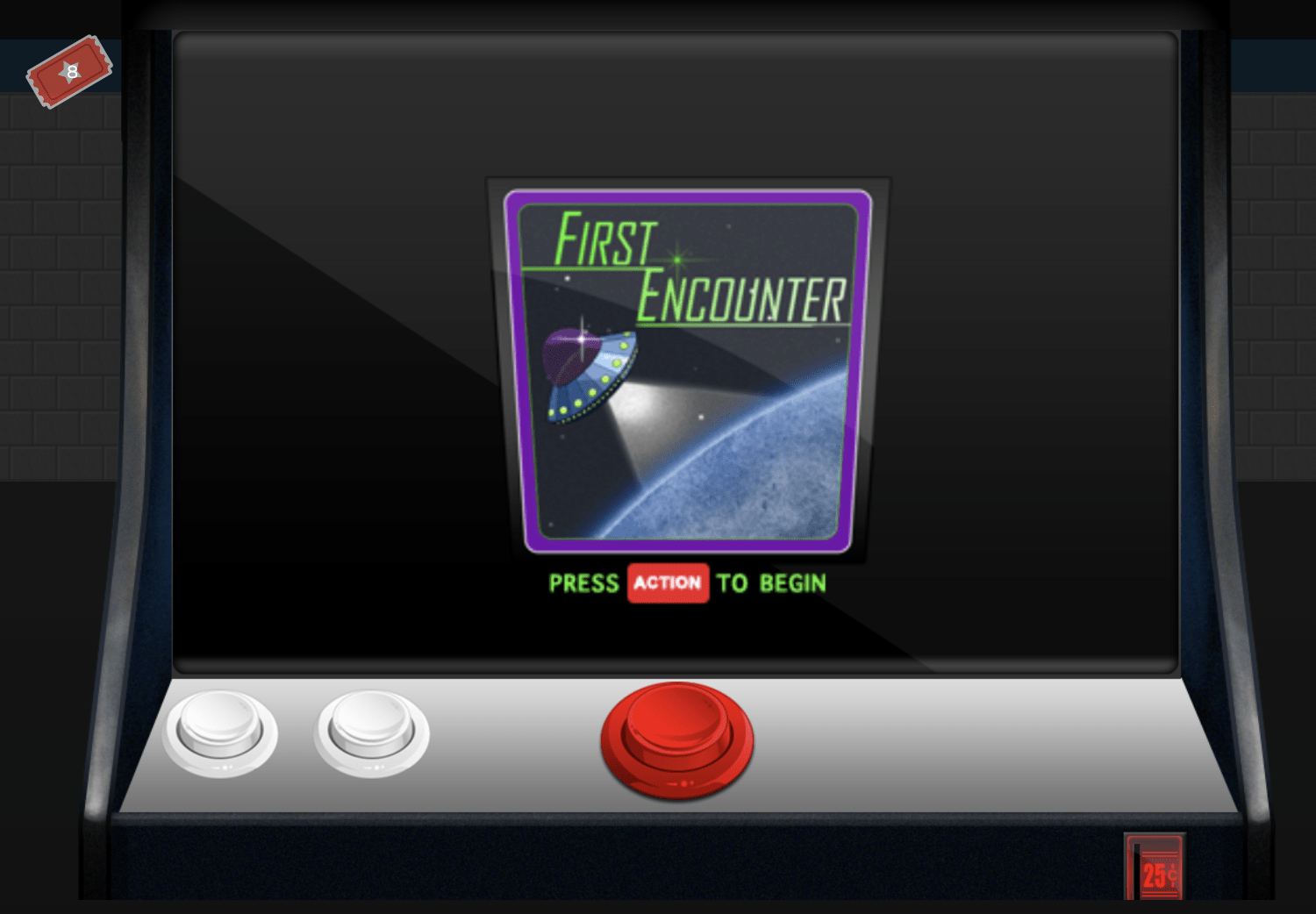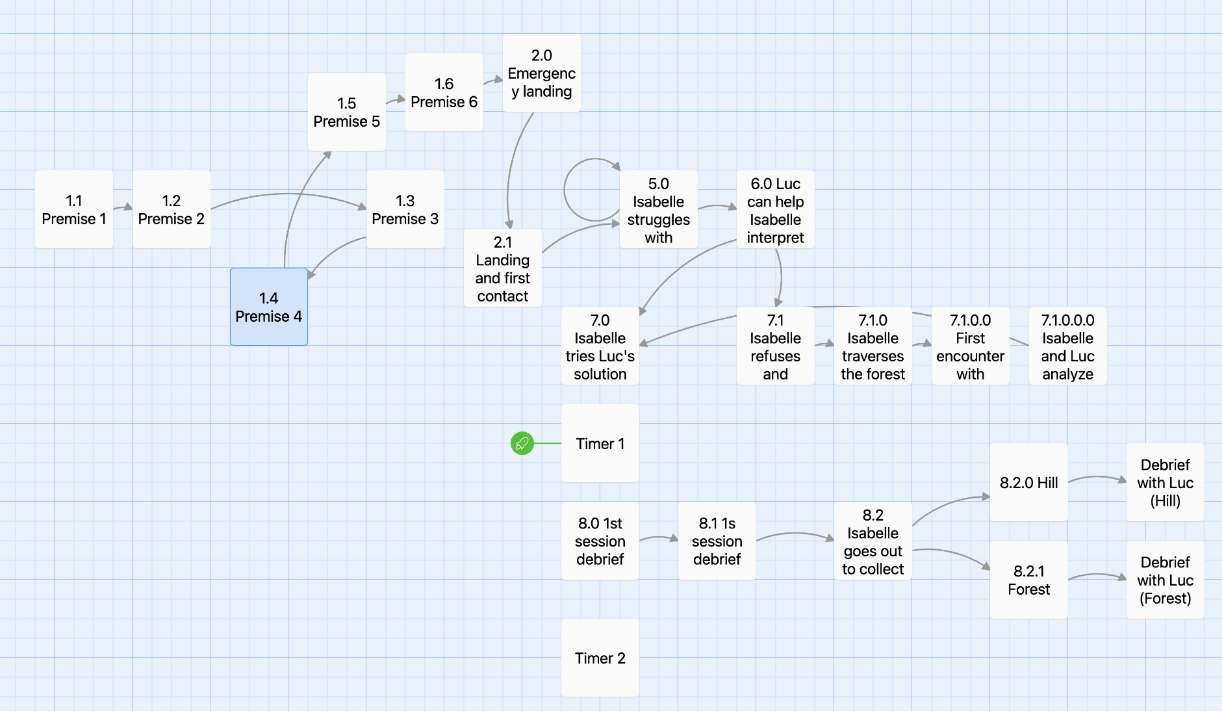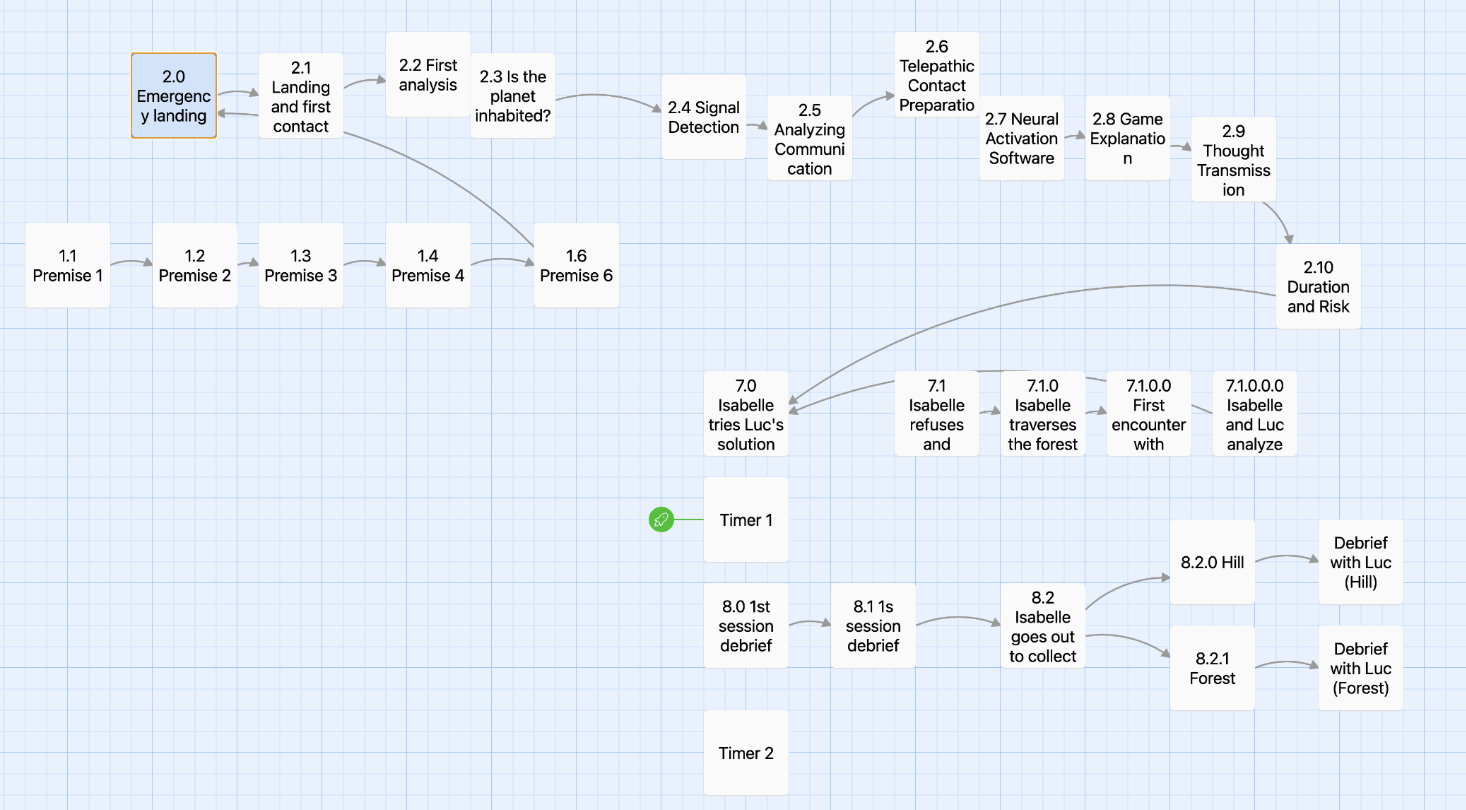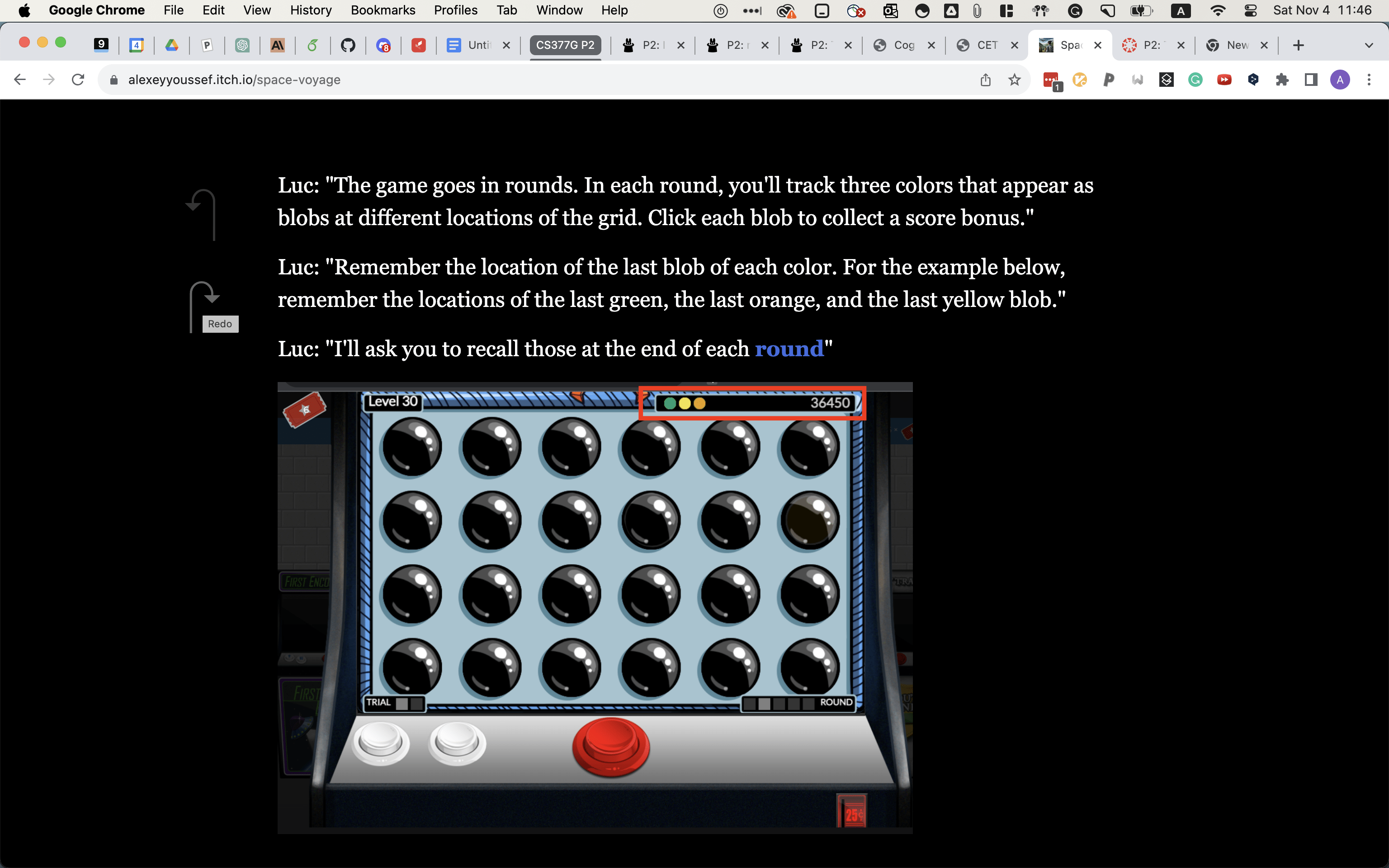Project summary
- Name: Alex Youssef
- Deliverable: P2 The Future We Deserve
- Date: November 3rd, 2023
- Game Title: Space Voyage
- Game URL: https://alexeyyoussef.itch.io/space-voyage (Password: Test_CS377G)
Game Summary
In the year 3005, Earth has been ravaged by war, leaving humanity’s survival dependent on finding a new Earth. “Space Voyage” is a space-themed interactive fiction that immerses players in the role of Anne Moreau, an astrophysicist, and part of an elite space exploration task force. Her mission is to find a new habitable planet for humanity’s future.
The game combines an engaging narrative with cognitive exercises, educating players about ADHD and cognitive science while making them empathize and engage with the main character of the game and her background story. As Anne, players will navigate through space stations and deep space, making critical decisions that will determine the fate of the human race. Survivors of Earth’s destruction have taken to space stations, harnessing solar energy or joining expeditionary forces to scavenge resources.
Anne’s journey is personal and fraught with the guilt of raising her daughter, Sage, in this new, harsh environment. Alongside Anne is Luc, a sentient AI assistant who guides her through the challenges of space travel. The game’s narrative branches based on player choices, with each path offering a unique perspective on the challenges faced by those with ADHD or a unique background context about Anne and her family.
The game subtly introduces players to the concept of neurodiversity and ADHD to build awareness and empathy towards this societal issue. The game also introduces the player to the concept of cognitive training and the ability to improve our brain capabilities via the strengthening of neural circuitry.
The ultimate player’s goal is to secure a future for humanity. Players must use Anne’s skills and the cognitive tools at her disposal to navigate through space, make contact with allies, and find a new home for the human race. The narrative is rich with scientific concepts and the emotional depth of a family striving to find their place in the cosmos.
Game mechanics
- The game is an interactive fiction text adventure with branching narrative passages.
- Key mechanics include making dialogue choices to progress the story.
- There are branching storyline paths based on the dialogue options chosen.
- Some choices lead to bad endings that reset the game.
- There are audio and visual elements like sound effects and images to enhance immersion.
- The main gameplay segments involve completing cognitive training exercises represented through minigames.
- The training games focus on memory, spatial skills, intuition, and emotion recognition.
- The games increase in difficulty and must be completed to progress the story.
- The game was intentionally designed around a single set of cognitive exercises as a proof of concept experiment. Future game iterations would create further narrative depth and introduce more cognitive gameplay loops.
- The game design recognizes the importance of story-to-cognitive play balance. This balance rewards the player with enough narrative to keep them engaged through the difficult cognitive exercises and motivates them to do those exercises to unlock further narrative.
- Navigation between narrative passages and games is designed to feel like interacting with a holographic AI interface.
- There are skill checks where the player’s training level impacts succeeding at certain narrative challenges.
- The overall arc moves from interactive storytelling to cognitive training games back to narrative outcomes based on player choices.
- Successful training unlocks the final telepathic communication with the aliens, leading to the game’s resolution and saving humanity.
- The core mechanics aim to reinforce the narrative through interactive cognitive challenges that simulate enhancing mental abilities.
- The game uses the medium by
- Offering branching narratives at different sections
- Integrating images into gameplay
- Integrating sound effects into gameplay
- Integrating timers and auto-transitions between passages
Philosophical Underpinnings and Conclusion
- The game explores what it means to be human versus something more than human. It asks if gaining superhuman abilities would change what makes us human at our core.
- The narrative juxtaposes the enhanced aliens with the protagonist’s struggles with ADHD. This encourages reflection on human limitations and neurodiversity.
- It aims to elicit thoughts and empathy towards neural diversity as part of the human experience, as well as our desire to overcome our innate constraints.
- It aims to elicit thoughts on our ability to enhance our cognition and brain capabilities that are core to our daily functioning.
- The player’s journey culminates in successful contact with the telepathic aliens, setting up future human-alien cooperation.
Playtesting questions and observation sheet
I have structured my playtests into (pre-playtest, during-playtest, and post-playtest segments)
Pre-Playtest Questionnaire:
- Do you like space-themed games?
- What do you know about ADHD and cognitive training?
- Do you see brain abilities as static or dynamic?
During-Playtest Observations:
- Observing the facial expressions of the player
- Observing the pace of moving between passages
- Observing their emotions during the different parts of gameplay
- Observing their understanding of the instructions
Post-Playtest Questionnaire:
- Did you understanding of ADHD and cognition improve? If so how?
- Are the gameplay segments an appropriate length?
- Do the game mechanics make sense so far? Are the instructions clear?
- Is the difficulty curve of the gameplay appropriate as you progress?
- Does the narrative motivation connect well with the gameplay incentives?
- How satisfied are you with the overall narrative arc and conclusion?
- Did you empathize with the main character’s struggles?
- Were there any moments that felt disconnected between story and gameplay?
- What was your main takeaway from the experience?
- What improvements or changes would you suggest?
- On a scale of 1-10, how likely are you to recommend this game to a friend?
- Do you have any other thoughts or feedback to share?
Playtests (9 playtest sessions)
1. Playtest with Ali (October 24, 2023)
- Felt the opening of the narrative was too dense with text
- Suggested shortening passages to improve pacing
- Story progression from passage to passage was unclear
- The story felt more like reading rather than immersive fiction
- Links between passages needed refinement
- Ali did not feel fully immersed in the story
- Needed to simplify and clarify the narrative arc
- Needed to change the narration from the third person to the second person point of view
2. Gamenight playtest with Amy (October 25, 2023)
- Game was glitching and getting stuck in loops
- Playtime for cognitive game was too long (5+ mins)
- Passages were too long and should be split up
- Needed smoother transitions between passages
- Instructions were confusing and needed clarification
- Identified grammar errors to fix
- The ratio of story to cognitive gameplay was off
- Needed more signposting for mood/location changes
- Unclear why player should do training gameplay. There was no enough motivation for the player to save humanity.
- Missing initial story motivation
- Suggested Monument Valley as example
- The story should be 10+ minutes
- Improve game/reward balance
- Do more gameplay loop design
3. In-class playtest with Chinat (October 26, 2023)
- Wanted more gameplay loops and branching
- Suggested additions like ship explosions or SOS scenarios
- Felt the narrative was too linear
- Players jumped through slides quickly without reading
- Needed more varied gameplay outcomes
4. Two Playtests with Sai and Rachel (October 31, 2023)
- Felt the ADHD reveal was too sudden
- Suggested introducing ADHD context/character earlier
- ADHD narrative seemed designed to make players proud of having ADHD
- “AI selected you” part needs changing because it seems too cheesy
- Isabelle’s ADHD experiences should be in her own words
- Isabelle should explain being bullied due to ADHD
- Bring Isabelle in earlier
- Take into account that some ADHD stereotypes may be offensive to players with ADHD
- Slow down or remove time transitions
- Add names to dialogue (especially for Luc)
- Change the main character name from Isabelle to something more memorable
5. In-class playtest with Laura and Max (October 31, 2023)
- They skimmed over long text passages
- Questioned the motivation for neural training gameplay
- Instructions were rushed through without retention. Playtesters did not know how to play the first round of the cognitive games because they rushed through the instructions
- Too little choice, but the choice in the game was high quality and engaging
- Passages may be too long
- Break text into smaller chunks
- Use hyperlinks for ADHD details
- Allow passage branching/exploration
- Enable examining inventory/objects
- Tie ending back to overcoming ADHD
- Fix grammar errors:
- Plant -> planet
- Your – You’re
- Plant -> Planet
- Plannet -> Planet
- Set set -> set
- Bugs with game transitions
6. In-class playtest with Hannah (November 2, 2023)
- The gameplay instructions for cognitive games were confusing
- Wanted more clarity on cognitive game rules
- Bug with last passage transition
- Felt ADHD portion was still too abrupt
- Lack of lead-up to ADHD reveal
- The central executive example resonated very well. She liked how the neuroscience was explained
- Engaged with game but instructions too hard
- Hannah found it informative to read about ADHD experiences
7. Playtest with John (November 2, 2023)
- Skeptical at first but got into story
- Felt ADHD stories were realistic
- Enjoyed the games but forgot the instructions
- Takeaway was not clear
- Disliked aliens plot
- Appreciated concise text
- Felt story was a bit linear
- Ending should leave space for imagination
8. Playtest with Julia (November 2, 2023)
- Instructions transition was unclear
- Adjust hill/forest paragraph
- Leap between narrative and ADHD felt shoehorned
- Transition from narrative to gameplay was okay
- Ending was too abrupt
- Too much reading, not enough choices
- Training being 5 weeks was inconsistent; increase the length of training in the narrative into many months to make the narrative more realistic
- Exposition was very good
- Suggested showing the guilt Anne felt towards Sage rather than just saying “she felt guilty”
- Suggested gameplay like Neopets with points
Game versions (six versions)
1. Cognitive Voyage v1.0:
- I changed the initial layout to be less linear with branch choices (e.g. the emergency landing or the SOS signal)
- Tested Google image links for SOS and explosion game endings. I troubleshot a few options to embed text and image
2. Cognitive Voyage v1.1:
- Shortened and streamlined passages
- Introduced ADHD context for character earlier to build exposition and empathy
3. Cognitive Voyage v1.2:
- Improved premise and motivation for making contact with aliens and repairing the ship
- Refined first gameplay section (prior to cognitive gameplay)
4. Cognitive Voyage v1.3:
- Added space between choice options
- Changed end game to restart (for the explosion and SOS options)
- Removed counter from ADHD passages and made transition click-based
- Added partner/child/family context for character to build exposition
- I changed Isabelle’s name to Anne for simplicity
- Clarified character identity earlier
- Changed how ADHD reveal happens to avoid seeming forgotten
- Added passages reflecting on lived ADHD experiences to build empathy
- Positioned ADHD as alienating to drive empathy
- Avoided offensive ADHD stereotypes
- Added names to dialogue
- Added an ending
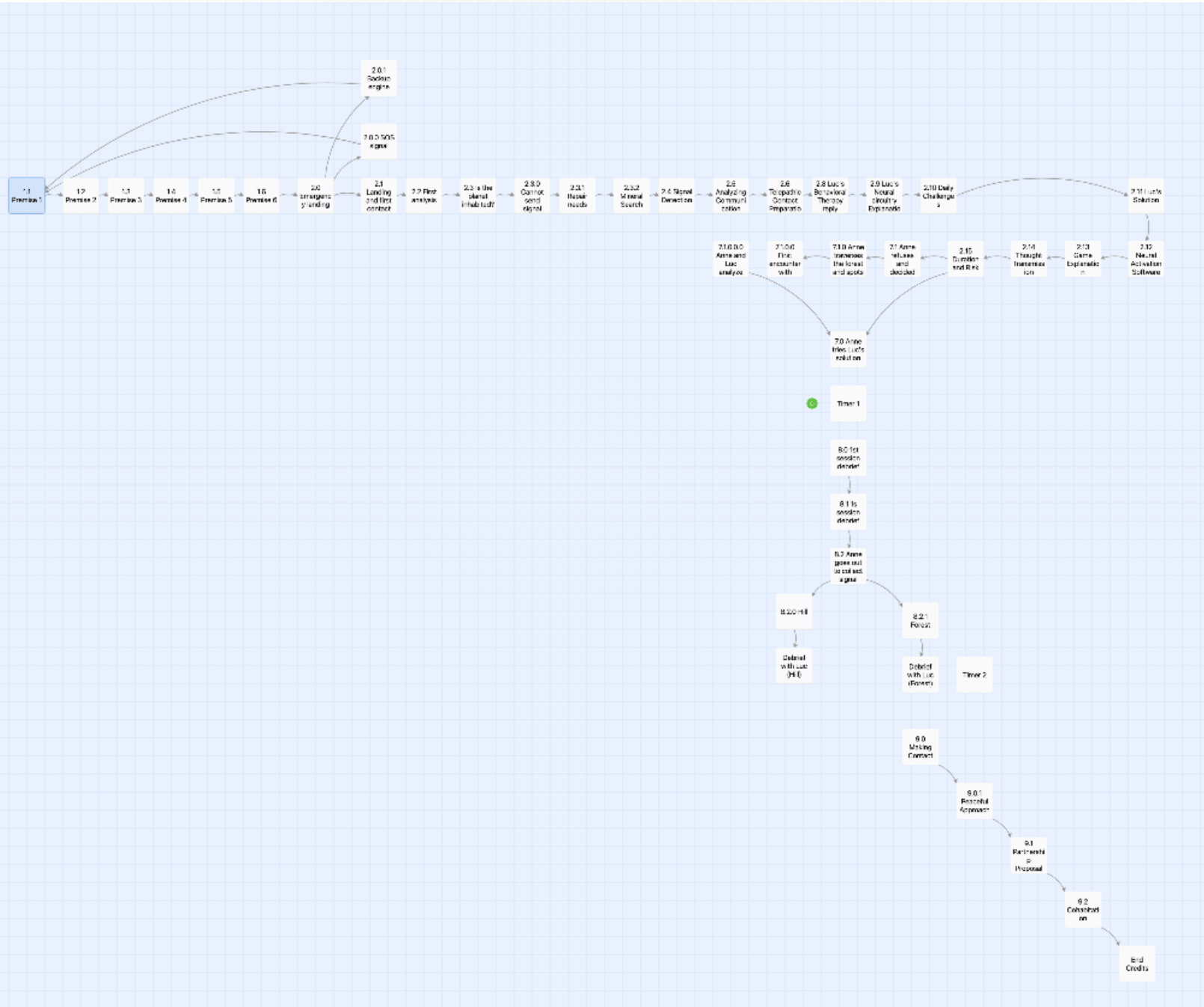
5. Cognitive Voyage 1.4:
- Smoothed game transition and difficulty
- Reinforced reading instructions before gameplay by adding instructions in a visual format integrated into the twine narrative before the player transitions to cognitive gameplay
- Fixed text bugs and grammar issues
- Broke up long passages into smaller chunks of 1-3 sentences
- Debugged issues with timer and automatic transition
- Add audio effects to the encounter with aliens
- Refined ending by mentioning reuniting with family
- Rearranged passage layout for a clearer narrative tree
- Standardized how Luc communicates
- Decided against an additional training session. I decided to have only one cognitive training session to test the concept. As the narrative grows in the future, I would be able to add more sessions. The rationale was to keep a ratio of story:cognitive gameplay that would be engaging and exciting to the player
- I added the instructions of the cognitive game into the narrative itself so that the player can’t skip it and would not get frustrated because they do not know how to play the cognitive game
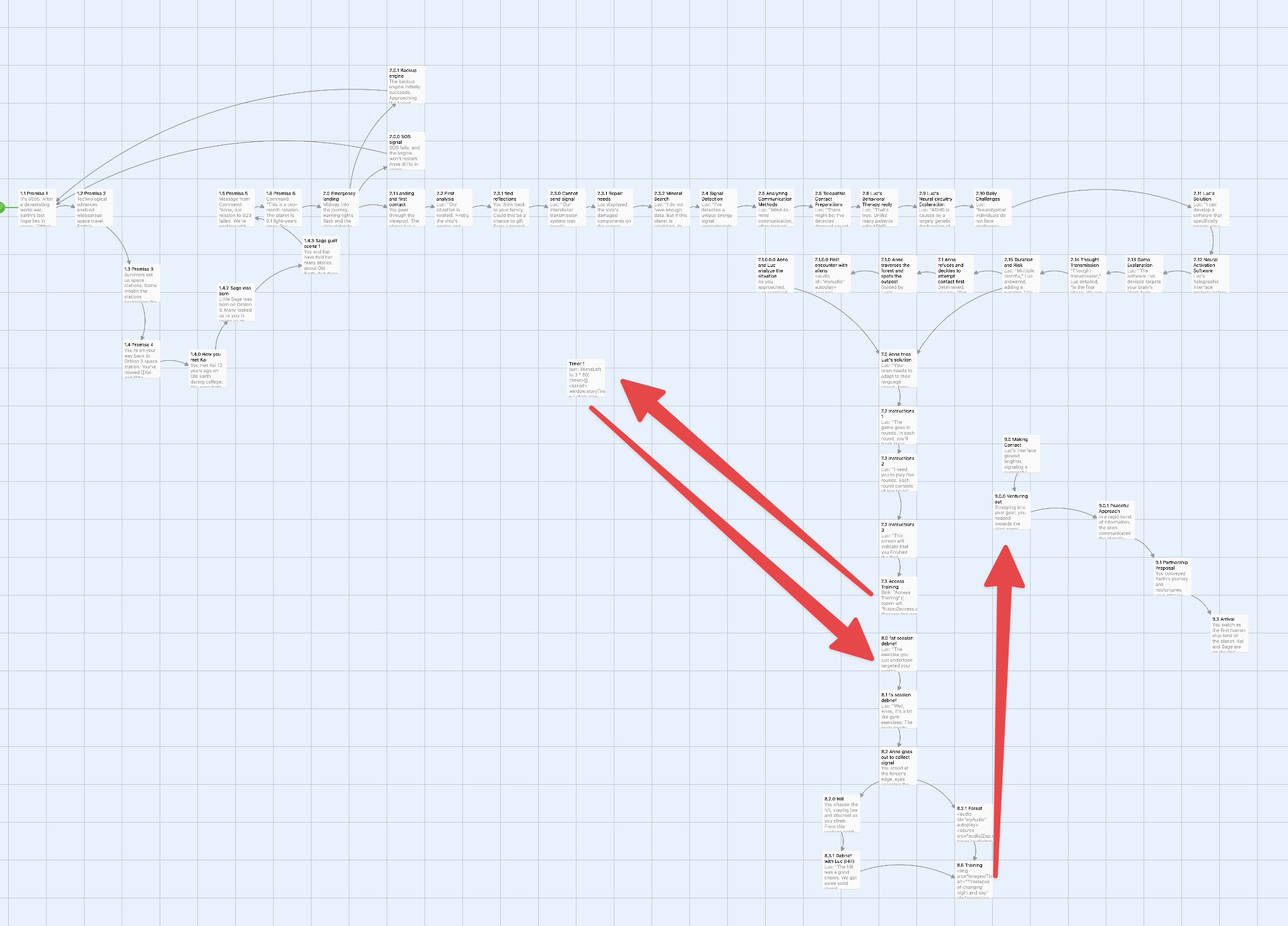
6. Cognitive Voyage 1.5 (Final):
- Standardized images by using DALLE3
- Adding a final ending message that encourages the player to reflect on the use of cognitive training to build the future we want (treat diseases and improve human potential)
- Improved the inclusiveness of the game by adding comprehensive alt text to the images
- Added an actual example of an interaction between Anne and Sage to the passage in which Anne reflects on her guilt toward Sage
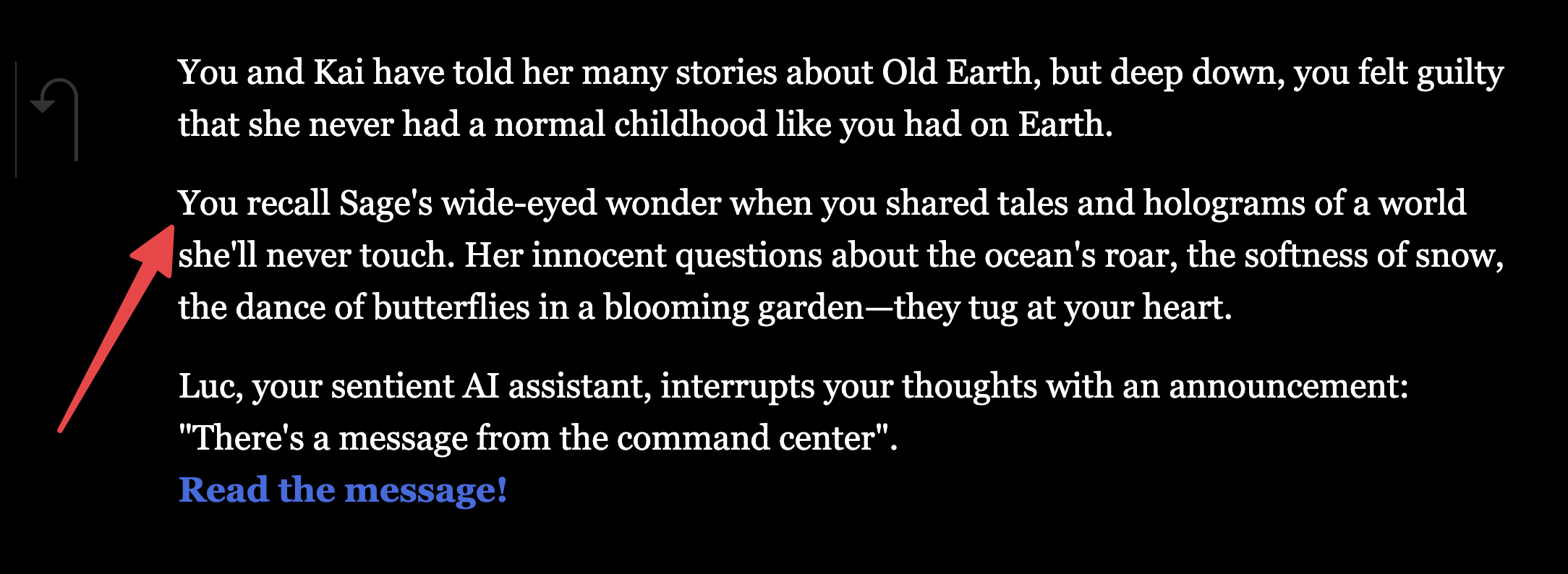
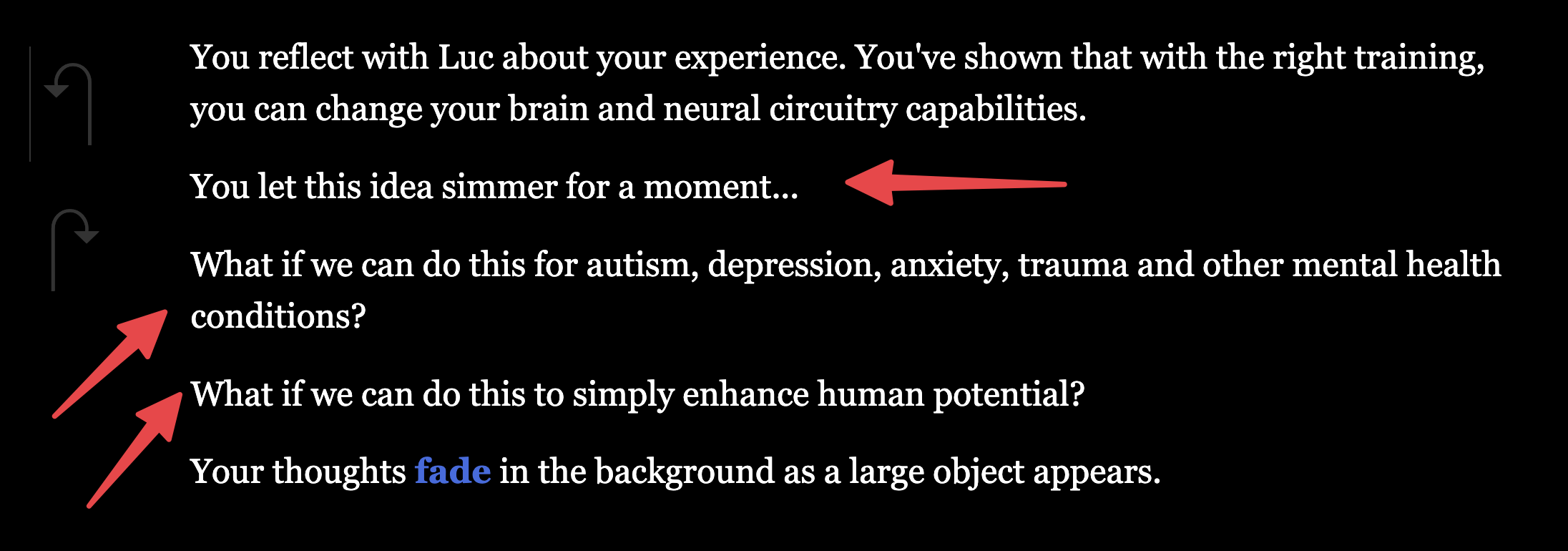
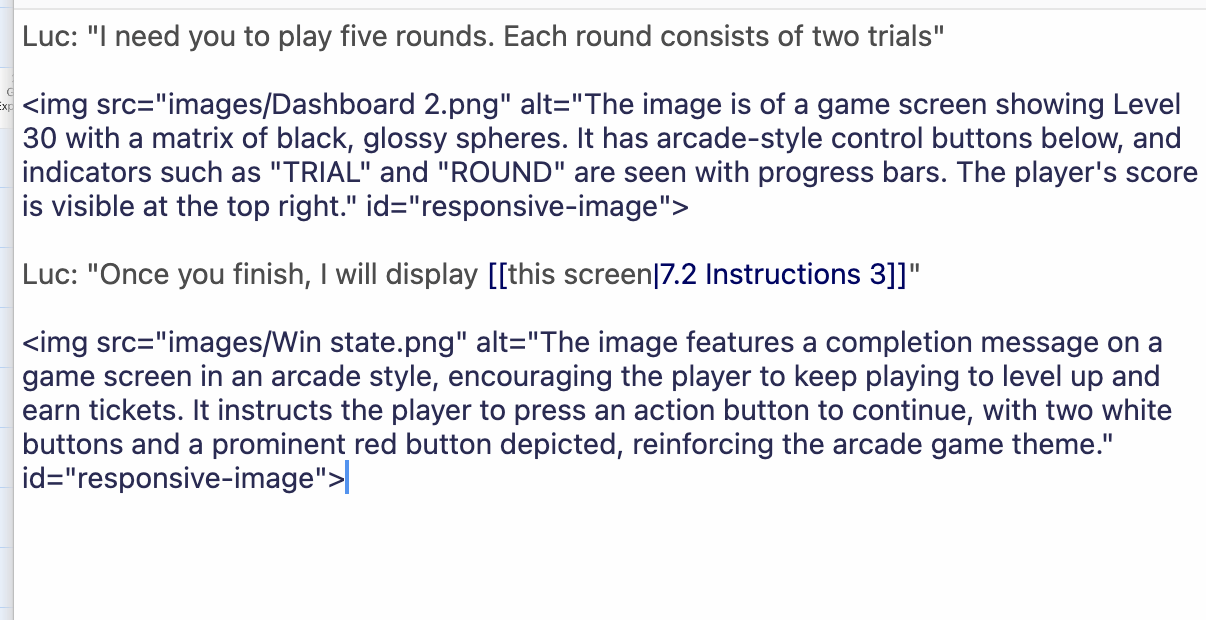
Comparable games (for future development)
- Monument Valley
- Neopets


